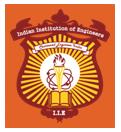THE ACADEMIC PROGRAMME OF THE INSTITUTION MAINLY CONSISTS OF SECTIONS ‘A & B’ EXAMINATIONS, POPULARLY KNOWN AS THE AMIIE EXAMINATION.
DIPIIE in Tool and Die Engineering
Information For:
- Home
- Examination
- R&D
- Application Status
- Apply Membership Online
- RTI Information & Reply
- Awards
- Become Student's Chapter
- Online Verification
- Placement Service
- Alumni Association
- Approval & Recognition
- AMIIE(B.Tech./B.E.)
- DIPIIE-DMIIE-TMIIE(Diploma)
- List of Student's Chapter
- Our Vision
- Circular/Notice/Tender
- Hall Ticket
- Examination Result
- Vacancy & Career
- Global Linkage
- Downloads
Key Highlights of the AMIIE
- Project based learning through industry collaborations.
- Focus on skill building & practical implementations.
- Interactive sessions with industry experts through Student's Chapter.
About
Tool and Die Engineering focuses on designing and creating tools, dies, and molds used for manufacturing components in industries such as automotive, aerospace, and electronics. These engineers ensure precision and efficiency in mass production processes by designing tools that shape, cut, or form materials into specific shapes. They work with materials like metals and plastics, utilizing CAD software for design and overseeing the fabrication and testing of tools.
Career
A career in Tool and Die Engineering involves designing, creating, and maintaining the tools and dies used in the manufacturing process of parts across various industries. Tool and die engineers work with materials like metals, plastics, and composites to create molds, jigs, and dies that are essential for forming and shaping components in industries such as automotive, aerospace, electronics, and manufacturing.
Key roles include die designers, who create the blueprints for molds and dies; toolmakers, who fabricate the physical components; and maintenance engineers, who ensure the tools and dies function effectively and are well-maintained. Tool and die engineers also work with Computer Numerical Control (CNC) machines, CAD software, and 3D modeling to design and optimize tooling processes.
This career requires a blend of skills in mechanical design, material science, and manufacturing processes. Engineers in this field can work in a variety of settings, from automotive manufacturing plants to precision tooling shops. With the advancement of automation and technology, tool and die engineers who specialize in CNC machining, additive manufacturing, and advanced materials will have a competitive edge.
Job Prospects
High Demand: Continuous need for precision tooling in industries like automotive, aerospace, and electronics.
Diverse Roles: Opportunities in design, manufacturing, and maintenance of tools and dies.
Global Opportunities: Jobs in manufacturing plants, tool-making companies, and design firms.
Technological Advancements: Growing demand for expertise in CNC machining and automation technologies.
Remuneration
Tool and Die Engineers typically earn between $50,000 and $80,000 annually, depending on experience, location, and industry. Senior engineers or those with specialized skills in CNC machining or advanced manufacturing techniques can earn upwards of $90,000. Additional benefits may include health insurance, retirement plans, and performance bonuses.
Section-A
Section-B
- STRENGTH OF MATERIALS
- FLUID MECHANICS
- MATERIAL SCIENCE & ENGINEERING
- WORKSHOP TECHNOLOGY
- ENVIRONMENTAL ENGINEERING
- METROLOGY
- TECHNICAL ENGINEERING DRAWING
- THEORY OF MACHINES
- THEORY OF ELECTRICAL ENGINEERING
- FLUID POWER & TRIBLOGY
- INDUSTRIAL ECONOMY & MANAGEMENT
- AUTOMOBILE ENGINEERING
- MANUFACTURING TECHNOLOGY
- INTERNAL COMBUSTION ENGINE
- CNC MACHINE
- REFRIGERATION & AIR CONDITIONING
- POWER PLANT ENGINEERING
- THERMAL ENGINEERING
What Is AMIIE?
Full form of AMIIE is “Associate Member of the Indian Institution of Engineers”. AMIIE is a professional certification given by Indian Institution of Engineers (IIE).

